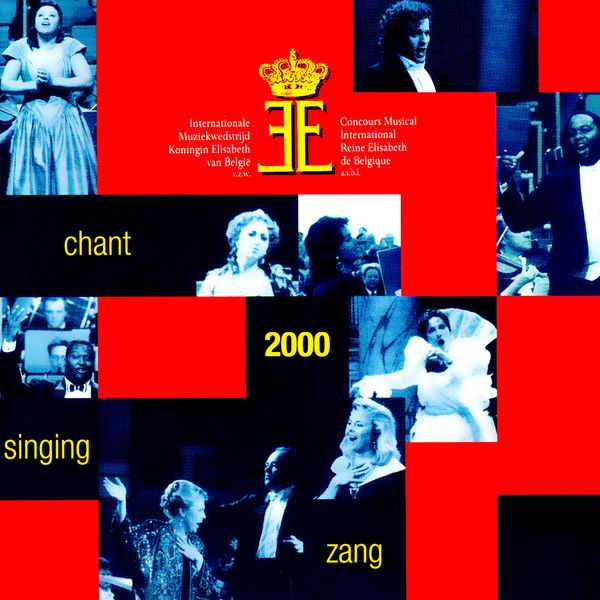
Number of Discs: 2
Format: FLAC (tracks)
Label: Queen Elisabeth Competition
Catalogue: CYP9610
Release: 2000
Size: 498 MB
Recovery: +3%
Scan: cover
CD 01
01. Monteverdi: L’Orfeo: Dal mio Permesso amato (La Musica)
02. Handel: Judas Maccabäus: I feel, I feel the Deity within – Arm, arm ye brave!
03. Bach: Weichet nur, betrübte Schatten: Die Welt wird wieder neu – Phoebus eilt
04. Handel: The Messiah: Why do the nations so furiously rage together
05. Chausson: Poème de l’Amour et de la Mer: Le temps des lilas
06. Wagner: Wesendonck-Lieder: Schmerzen
07. Wagner: Wesendonck-Lieder: Traüme
08. Grieg: Gruss
09. Grieg: Zur Rosenzeit (No. 5 from Seks Sange, Op. 48)
10. Kos-Anatolsky: Solovinyi Romans
11. Françaix: Huit anecdotes de Chamfort
12. Kasabji: Ya Touyour
13. Laporte: Momenti d’estasi
14. Diepenbrock: En sourdine
15. Jongen: Chanson roumaine
16. Schubert: Nacht und Träume, D827
CD 02
01. Tchaikovsky: Evgeny Onegin: Kuda, Kuda (Lemski)
02. Rossini: L’italiana in Algeri: Cruda sorte – Qual chi vuol (Isabella)
03. Mozart: Die Zauberflöte: Ach, ich fühl’s (Pamina)
04. Mozart: Le Nozze di Figaro: Hai già vinta la causa – Vedrò mentr’io sospiro (Conte)
05. Puccini: Senza mamma, o bimbo (from Suor Angelica)
06. Mahler: 7 Lieder aus letzter Zeit: Ich bin der Welt abhanden gekommen
07. Wagner: Götterdämmerung: Höre mit Sinn (Waltraute)
08. Bizet: Carmen: La fleur que tu m’avais jetée (Don José)
09. Berlioz: Les Nuits d’été: Au cimetière
10. Tchaikovsky: The Queen of Spades: Da, vspomnila (Pauline)
11. Verdi: Macbeth: O, figli (Macduff)
12. Dvořák: Rusalka: Mĕsíčku na nebi hlubokém (Rusalka)
The Queen Elisabeth Competition had already been established as one of the most prestigious international musical events when, in 1988, it was decided to add to the violin and piano the oldest instrument of the world: the voice. Thus the Singing Competition came into being, held every four years like the older categories and particularly demanding because of its length and the different styles imposed to the candidates. The competition immediately benefited from the know how of its advisers and an experienced organisation with excellent media coverage.
Success came quickly. The variety of talents, repertories and styles gave the bests the opportunity to express themselves with three different accompaniments: the piano (for lied and melody), the orchestra of ancient instruments (for opera, cantata and baroque oratorio), and the symphony orchestra (from the classical era until today). A piece in the semi-finale (written by the eminent Belgian composer André Laporte), allowed an evaluation of the skills of the candidates vis-a-vis a contemporary score. The jury was of an exceptional standard – embodying the history of song of the past 50 years – and was responsible for the difficult task of passing a verdict.
The programme was comprehensive, the standards high and the award reflected this situation accurately.
The ovation for the winner of the First Prize, contralto Marie-Nicole Lemieux (Canada) said it all. The naturalness of her voice, the quality of her technique, the sincerity of her emotion and her charming approach enchanted professionals and amateurs alike.
The Second Prize for Marius Brenciu confirmed the good impression that this young Romanian natural tenor had made day after day. His vocal qualities and the strength of a well-acquired tradition in opera singing made him remarkable.
Soprano Olga Pasichnyk (Ukraine) had been a favourite from the beginning because of her general quality. Combining beauty and maturity, intelligence and instinct, technique and unusual natural gifts, she made everybody forget until the finale that she took part in a competition. Third Prize and awarded with the “Prix du Public”, she seems ready to face the challenges of the big roles in the classical repertory.
Last but not least, Pierre-Yves Pruvot, Lubana Al Quntar and Margriet van Reisen: are three names to remember: already mature, the male voice is elegant and in command, whereas the female voices dispose of a rare timbre which are bound to make those happy who have the good fortune of hearing them.